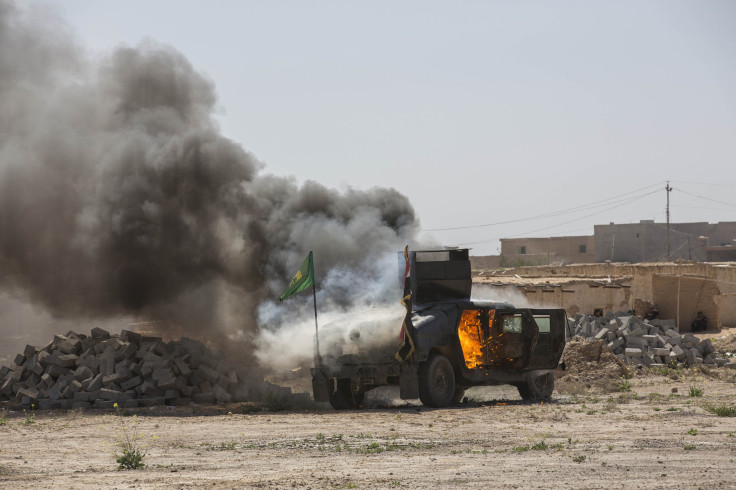Sectarian Tensions Stall Iraqi Military's Fight Against ISIS In Tikrit

ISTANBUL -- The fight against the Islamic State group in Tikrit is at a standstill, as the Iraqi military reorganizes itself on the front lines. In an attempt to wipe out the Sunni militant group completely from the area, some leaders in the Iraqi military are considering asking new forces, including Shiites, to enter the fight, according to a source within a Shiite militia who asked to remain anonymous for security reasons. The approach is igniting decade-old rifts between Shiite and Sunni fighters and is perpetuating the military's distrust of Iranian-backed Shiite militias, preventing them from making advances.
The fight against the Islamic State group, also known as ISIS or ISIL, in Tikrit underscores the broader difficulty the Iraqi military faces in trying to push out the militant group completely from the country. The sectarian divisions between the paramilitary and military forces in Iraq pose a problem not just in defeating ISIS in Tikrit but also in repelling the militant group in other Sunni-majority places such as Anbar province. In Anbar, the Sunni tribes and the local police forces are leading the fight against ISIS, and they are refusing to allow Shiite militias to intervene.
The battle for Tikrit was one of the Iraqi military’s first major attacks on ISIS since the militant group took Mosul, Iraq’s second largest city, in June. It was supposed to showcase the Iraqi military's ability to roll back ISIS in a coordinated strategy; Baghdad's forces have fought ISIS in smaller battles throughout the country over the past eight months, but the attack in Tikrit was systematically organized and led by 20,000 Shiite militia fighters, some of them supported by Iran. That effort is now being threatened not only by the high number of military casualties on the front lines but by disagreement among military leaders about how to proceed.
Khaled al-Obeidi, Iraq's defense minister, said the Iraqi military was halting its assault in Tikrit to minimize casualties, but recent interviews with top military and paramilitary leaders have shown deep divides between the two when it comes to strategy in Tikrit.
Some military leaders have been quoted as saying they want the U.S.-led coalition to intervene, from the air, in the battle for Tikrit. The U.S. has been arming and training Iraqi army soldiers for months and communicating with military leaders on how to fight ISIS.
But the U.S. has distanced itself from working directly with Shiite paramilitary fighting groups by conducting airstrikes, because that would make the U.S. look like it's coordinating with Iran, officially an adversary. American air support for Iran-backed fighters would look awkward in Tehran as well; Shiite armed groups, most of whom are backed by Iranian money, say they do not need air support from the U.S.-led coalition.
"Some of the weaklings in the army ... say we need the Americans, while we say we do not need the Americans," said Hadi al-Ameri, the leader of the Badr brigade, a Shiite fighting group, on Sunday.
The Iraqi military has so far not officially asked the U.S. to intervene with airstrikes in Tikrit, and Washington, D.C., insists that ISIS is retreating from Tikrit.
CIA Director John Brennan said in an interview with Fox News Sunday that ISIS was no longer “on the march.” He argued that the Sunni militants’ momentum in Iraq and Syria had been blunted by U.S. and Iraqi efforts at fighting the group’s advance.
"Clearly ISIS' momentum inside of Iraq and Syria has been blunted, and it has been stopped. So they are not on the march as they were several months ago," Brennan said in the interview. "Our working with the Iraqis, and now the Iraqis trying to push back against it, it is having some great progress."
But ISIS is not retreating in Tikrit; the Sunni group still holds ground in the center of the city. Paramilitary groups have said the battle in Tikrit is expected to pick up again at the end of this week, after official meetings between military and Shiite battalion leaders in Baghdad that may smooth the political terrain for an offensive.
© Copyright IBTimes 2024. All rights reserved.











